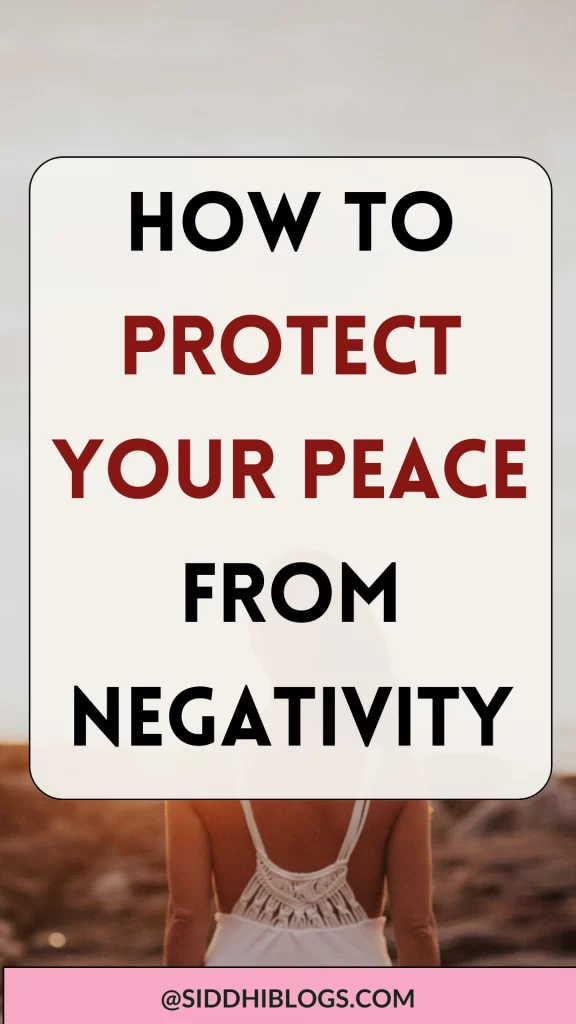Many of us feel overwhelmed, burned out, or stuck in cycles of negativity because we allow external circumstances, relationships, and expectations to control our sense of well-being. But what if you could stop letting things outside of your control determine your happiness? What if you could take steps each day to protect your peace?
With daily pressures, constant notifications, and unending demands on our energy, it’s no wonder so many of us feel drained and disconnected.
Yet, achieving inner calm isn’t an impossible dream. It’s something we can actively create and protect. Your peace is in your hands. You can make a choice each day to protect your peace and save your mental energy.
Here’s how you can start prioritizing your peace and preserving it today.
What Does It Mean to Protect Your Peace?
Protecting your peace is about creating an internal environment of calm and clarity, even in the face of external chaos. It’s not something you ever think about until you realize how much you’ve been letting slip away.
I used to think I had to fight every battle, prove every point, and carry the weight of everything—other people’s expectations, their problems, even their opinions of me. It was exhausting. But then I hit this point where I was like…
Why am I doing this? Why am I letting the chaos around me become the chaos inside me?
-It’s like deciding to curate your life the way you’d curate your favorite playlist. You choose what stays and what goes.
-It’s not about running from problems, but about not inviting unnecessary ones.
-It’s being okay with walking away, saying no, or even just sitting in silence when the world wants noise.
– It’s about being intentional with your energy, setting boundaries, and refusing to let outside factors—like opinions, circumstances, or relationships—dictate your happiness.
Because, at the end of the day, if your inner world is at peace, everything else just feels… manageable.
This quote puts it rightly,
“Don’t let the behavior of others destroy your inner peace” – Dalai Lama
When we let the actions of other people disrupt our peace, we’re giving them the power to our emotions. I know it’s easier said than done, but this wisdom actually makes sense.
So, I will be sharing the helpful strategies you can apply to protect your peace.
Also read: Helpful Ways to Manage Overthinking
Disclaimer: This blog contains affiliate links to Amazon products. If you click on these links and make a purchase, I may earn a small commission at no additional cost to you. This helps support the blog and allows me to continue creating content. Your support is greatly appreciated!
Strategies to Help You Protect Your Peace

1. Build Boundaries: Your First Line of Defense
One of the most important ways to protect your peace is by setting boundaries. The foundation of protecting your peace lies in learning to say “no” and setting clear boundaries. Saying ‘yes’ to everything can make you feel like you are a good person who is helpful, reliable and likable.
But sooner, this habit of being available to everyone may feel draining. Every time you say ‘yes’ when you want to say ‘no’, you are letting yourself down.
Get clear on your limits: Reflect on what you’re comfortable with and what makes you feel uneasy. Your boundaries are personal; they don’t need to make sense to anyone else.
Communicate assertively: Whether with coworkers, family, or friends, let people know what you can and cannot accommodate. Statements like “I won’t be able to take that on right now” or “I need some time for myself” are simple yet powerful.
Enforce them with kindness: Boundaries are not about confrontation or guilt—they are about self-respect. When others overstep, gently remind them where the line is.
2. Practice Acceptance
Not being able to accept things disrupts our peace as it creates an internal battle between what is and what we wish it to be.
When we resist reality—whether it’s an outcome, a person’s behavior, or a situation beyond our control—we expend emotional energy trying to fight something immovable. This resistance doesn’t change the situation; it only amplifies our frustration, stress, and disappointment.
To protect your peace, the answer lies in shifting your perspective. Acceptance isn’t about agreeing with what’s wrong or resigning to it—it’s about acknowledging the reality of a situation without letting it consume you.
By practicing acceptance, you conserve your emotional energy for the things you can influence, allowing you to maintain inner calm even in imperfect situations.
Imagine your worries as physical objects in your hand. Close your eyes and visualize yourself releasing them one by one. Say, “I let go.”
When something doesn’t go my way, I ask myself, ‘Is this within my control?’ If the answer is no, I take a deep breath and remind myself that fighting it will only disrupt my peace.
3. Surround Yourself with Positive Energy
Our environment has an undeniable effect on our emotions, energy levels, and overall mental well-being. It’s something we don’t always think about, but where we spend our time can either lift us up or weigh us down.
A dull, cluttered, or chaotic space can quietly drain your energy, while a bright, organized, and inspiring environment can leave you feeling refreshed and motivated.
To feel calm and grounded, build a space and support system that reflects those values.
Declutter your space: A tidy environment can help declutter your mind. Start with small areas, like your desk or nightstand, and build from there.
Invite good vibes: Play soothing music, add greenery, or light a candle to create a peaceful ambiance.
Add elements that make you happy: Bring in things that spark joy—a plant, a favorite photo, cozy blankets, or even calming scents like lavender. These little touches can make a big difference.
Spend time with uplifting people: Energy is contagious. Surround yourself with those who inspire, support, and encourage you.
While you can’t control every aspect of your environment, you can choose to cultivate as much positivity as possible.
Related: A Things to Declutter Guide for a Simplified Life
4. Reduce Exposure to Negativity
Not everything or everyone deserves your time and energy. Negativity—whether in people, places, or media—has a sneaky way of unsettling our peace.
Take a step back and evaluate where your energy might be leaking.
- Assess your relationships: Are there people who constantly vent, complain, or bring you down? It might be time to spend less time with them or gently set limits on those interactions.
- Curate your media intake: social media and news cycles are designed to capture attention, often by playing on fears or insecurities. Be selective about the accounts you follow or the content you consume, and avoid doomscrolling and protect your peace and mental health.
- Reframe what you can’t control: If you can’t avoid a toxic environment, such as a tense family setting or a difficult workplace, find ways to limit your exposure. Join a club, spend time outdoors, or carve out moments of solitude where possible.
Every negative influence you remove creates more space for calm and positivity.
5. Stay Mindful
Mindfulness is about staying present and fully engaged in the moment. When your mind is constantly racing—worrying about the future or dwelling on the past—it’s hard to feel at peace.
Pause and focus on what’s in front of you. Whether it’s savoring your morning coffee or fully listening to a friend, mindfulness brings clarity and calm to your day.
The more you practice staying in the now, the less space there is for anxiety.
What’s powerful about mindfulness is that it doesn’t demand external changes to give you peace. It doesn’t tell you to wait for the perfect moment, to fix everything around you, or to control what you can’t.
Instead, it teaches you that peace is already here, waiting for you to notice it. It’s not found in doing but in being.
When you dwell on your mistakes or the ‘what-if’s’, mindfulness will act as an anchor to bring you back to the present moment. It’s about letting go of the past, and easing the fear of the future.
Also Read: Daily Habits for Mindful Living
6. Simplify Your Desires
This point is an important reminder to me as well.
Unlimited desires scatter our attention, dilute our energy, and create an endless loop of “what’s next?” It’s not that wanting things or pursuing goals is wrong—it’s the sheer quantity of these desires that leaves us perpetually unfulfilled.
Do all those desires really matter equally? Or are some of them just noise?
- Write down all the desires currently pulling at your energy.
- Cross off anything that feels unnecessary, overwhelming, or purely for external validation (e.g., impressing others). What’s left is your real priority.
- Break your main desire into small, manageable steps. This keeps you grounded and prevents you from slipping back into overwhelm.
- Focus only on what you can do today. Let tomorrow take care of itself.
Letting go doesn’t mean giving up forever—it just means putting certain desires on hold for now.
Well, simplifying your desires is a necessary step to protect your peace and focus on one desire at a time.
Choosing less everyday means you’re reclaiming your peace rather than draining your energy.
Read this guide to simplify your life.
7. Remember: It’s Not About You
One of the most liberating realizations is that not everything is personal. When others criticize, act out, or behave negatively, their actions often say more about their inner state than about you.
This perspective is beautifully explained in Don Miguel Ruiz’s book, The Four Agreements. “Hurt people hurt people,” as the saying goes. The bitterness or anger they project is a mirror of their own pain—not a reflection of your worth.
By refusing to internalize the negativity of others, you protect your peace. Let their words and actions pass through you without sticking.
Let constructive feedback pass through and stay with you, but let all negativity, gossip, or unwarranted criticism slip away.
8. Heal Your Self-Talk
Sometimes the loudest disruptor of our peace is the voice in our own head. Negative self-talk, self-doubt, and endless rumination can drain you just as much as external stressors.
- Tune into your thoughts: Spend a day noticing how you speak to yourself. Are your inner words kind, or do they criticize and belittle? Write down recurring negative thoughts to bring them into the light.
- Reframe the narrative: Remember, thoughts are not facts. A thought like “I’m not good enough” can be replaced with “I’m learning and growing every day.”
- Be gentle with yourself: Treat yourself with the same compassion you’d offer a close friend. The goal isn’t perfection; it’s progress.
Peace begins within, and that means being kind to yourself first.
You might like: Positive Self-Talk Examples for Tough Days
9. Practice Daily Gratitude
Gratitude is a powerful antidote to stress. It shifts your focus from what’s wrong to what’s right, training your brain to notice the good around you.
Gratitude sounds simple, yet it often feels like an uphill climb in our busy, complaint-driven lives. We get caught up in what’s wrong, what’s missing, or what’s not going our way. And when we do that, we overlook the very things that bring us joy and comfort.
How often do we pause to appreciate the warm bed we wake up in, the food on our table, the health we have, or even the ability to read and learn? These are privileges—tiny yet monumental—but they’re drowned out by complaints about work, relationships, or traffic.
- Keep it Simple: At the end of the day, write down three things you’re grateful for. These don’t have to be grand or extraordinary—a kind word, a cup of coffee, or the sound of rain outside is enough.
- Appreciate the Present: Take a moment, right now, to notice your breath. Isn’t it remarkable that your body knows how to keep you alive without any effort on your part?
- Flip Complaints into Gratitude: The next time you find yourself complaining, pause and ask, What can I be grateful for instead? For example, “I’m stuck in traffic” could shift to “I’m grateful I have a car to get me where I need to go.”
- Stay mindful: Throughout the day, pause and appreciate little moments, like the warmth of the sun or a kind word from a stranger.
Gratitude doesn’t erase life’s challenges, but it gives you the strength to navigate them with a lighter heart.
This might help: Gratitude Journal Prompts for your Night Routine
10. Make Self-Care a Non-Negotiable
Protecting your peace isn’t just about eliminating the negative; it’s also about nurturing the positive. If you don’t prioritize self-care, everything else in your life suffers.
When you neglect your well-being, you’ll find it harder to show up for others, meet your responsibilities, or pursue your goals. You can’t pour from an empty cup—self-care is how you refill it.
- Start small: Activities like deep breathing, stretching, or taking a quiet walk can help reset your nervous system and bring you back to center.
- Find your balance: Experiment with what works for you—meditation, journaling, or a daily gratitude practice. You don’t need a lengthy routine; even five minutes a day of intentional self-care can make a difference.
- Listen to Your Body and Mind: Pay attention to how you’re feeling. If you’re tired, rest. If you’re stressed, pause. If you’re overwhelmed, ask for help. Responding to your needs in the moment is a form of self-care.
- Commit to consistency: Whether it’s a calming morning ritual or a few quiet moments before bed, make self-care a daily priority.
Self-care isn’t about luxury—it’s about intention and prioritizing what truly nourishes your mind, body, and soul. It’s not limited to spa days, vacations, or pricey rituals (though those can be nice).
The daily simple things like sleeping on time and intentionally taking good care of yourself count as self-care.
More on Self-care:
Self-care Rituals from Around the World
Quick Self-Care Rituals for Busy Days
Self-Care Habits for Your Daily Routine
It’s not always easy to protect your peace, though. You have to learn to let go of things—some things you really wanted to hold onto. But I guess protecting your peace means understanding that not everything is worth your energy.
And that’s okay. It’s not giving up; it’s choosing yourself. And honestly? That’s the most powerful thing you can do.
So when you’re faced with the choice to hold on or let go, ask yourself: Is this worth my peace?
If the answer is no, remind yourself that it’s okay to choose freedom over familiarity. Because every time you protect your peace, you’re building a life that aligns with the version of yourself you want to be. And that? That’s real power.



